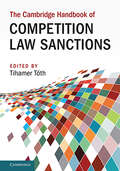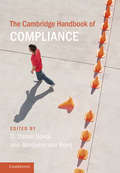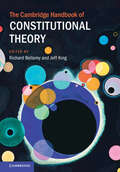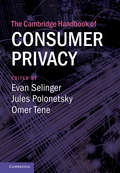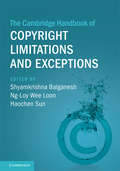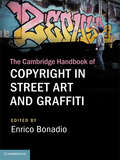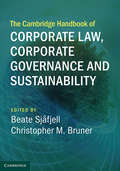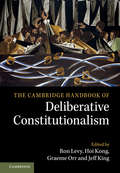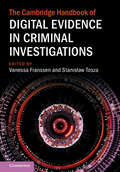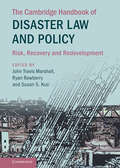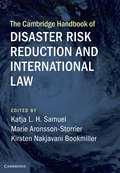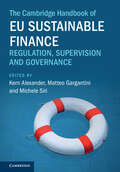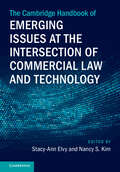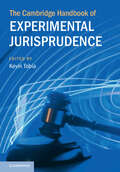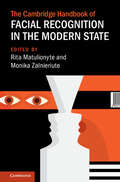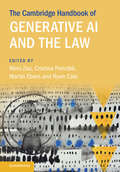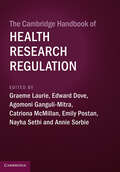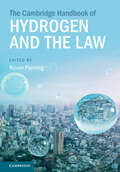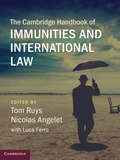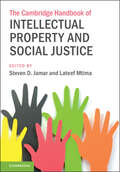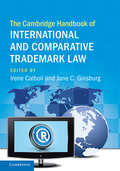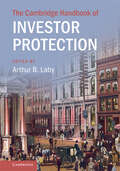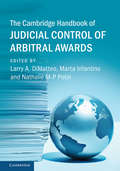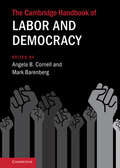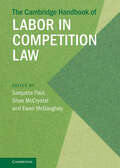- Table View
- List View
The Cambridge Handbook of Competition Law Sanctions (Cambridge Law Handbooks)
by Tihamer TóthThis handbook brings together an international roster of competition law scholars and practitioners to address the issue of sanctions in competition law from all angles. Covering nineteen jurisdictions around the world, the book analyzes the theoretical foundations and practice of sanctioning competition law infringements and, most importantly, cartels. Contributors include a range of experts drawing on criminal law, company law, labor law, human rights, and law and economics, to determine what sanctions are available as a matter of positive law against corporations and individuals, including fines and other criminal, administrative, and civil law sanctions; whether law enforcers are using these sanctions effectively; and if new sanctions – including individual sanctions – should be introduced.
The Cambridge Handbook of Compliance (Cambridge Law Handbooks)
by D. Daniel Sokol Benjamin Van RooijCompliance has become key to our contemporary markets, societies, and modes of governance across a variety of public and private domains. While this has stimulated a rich body of empirical and practical expertise on compliance, thus far, there has been no comprehensive understanding of what compliance is or how it influences various fields and sectors. The academic knowledge of compliance has remained siloed along different disciplinary domains, regulatory and legal spheres, and mechanisms and interventions. This handbook bridges these divides to provide the first one-stop overview of what compliance is, how we can best study it, and the core mechanisms that shape it. Written by leading experts, chapters offer perspectives from across law, regulatory studies, management science, criminology, economics, sociology, and psychology. This volume is the definitive and comprehensive account of compliance.
The Cambridge Handbook of Constitutional Theory (Cambridge Law Handbooks)
by Richard Bellamy Jeff KingThis Handbook brings together contributions from leading scholars of constitutional theory, with backgrounds in law, philosophy and political science. Its sixty chapters not only offer an exceptional survey of the field but also provide a major contribution to it. The book explores three main areas. First, the values upheld by a constitution, including rights, freedom, equality, dignity and well-being. Second, the modalities of a constitutional system, such as the separation of powers, democratic representation and the rule of law. Finally, the institutions through which it operates, both legal and political, including courts, elections, parliaments and international organisations. It also considers the challenges confronting constitutional arrangements from growing inequality, populism, climate change and migration.
The Cambridge Handbook of Consumer Privacy
by Evan Selinger Jules Polonetsky Omer TeneBusinesses are rushing to collect personal data to fuel surging demand. Data enthusiasts claim personal information that's obtained from the commercial internet, including mobile platforms, social networks, cloud computing, and connected devices, will unlock path-breaking innovation, including advanced data security. By contrast, regulators and activists contend that corporate data practices too often disempower consumers by creating privacy harms and related problems. <P><P>As the Internet of Things matures and facial recognition, predictive analytics, big data, and wearable tracking grow in power, scale, and scope, a controversial ecosystem will exacerbate the acrimony over commercial data capture and analysis. The only productive way forward is to get a grip on the key problems right now and change the conversation. <P>That's exactly what Jules Polonetsky, Omer Tene, and Evan Selinger do. They bring together diverse views from leading academics, business leaders, and policymakers to discuss the opportunities and challenges of the new data economy.<P> Proposes a new view of the consumer privacy debates.<P> Provides an interdisciplinary account of consumer privacy issues that includes contributions from industry leaders, activists, and policymakers.<P> Offers new pathways forward to move us beyond the current consumer privacy impasses.<P>
The Cambridge Handbook of Copyright Limitations and Exceptions (Cambridge Law Handbooks)
by Shyamkrishna Balganesh Loon, Ng-Loy Wee Haochen SunWhile copyright law is ordinarily thought to consist primarily of exclusive rights, the regime's various exemptions and immunities from liability for copyright infringement form an integral part of its functioning, and serve to balance copyright's grant of a private benefit to authors/creators with the broader public interest. With contributors from all over the world, this handbook offers a systematic, thorough study of copyright limitations and exceptions adopted in major jurisdictions, including the United States, the European Union, and China. In addition to providing justifications for these limitations, the chapters compare differences and similarities that exist in major jurisdictions and offer suggestions about how to improve the enforcement of copyright limitations domestically and globally. This work should appeal to scholars, policymakers, attorneys, teachers, judges, and students with an interest in the theories, policies, and doctrines of copyright law.
The Cambridge Handbook of Copyright in Street Art and Graffiti (Cambridge Law Handbooks Ser.)
by Enrico BonadioIn recent years, the number of conflicts related to the misuse of street art and graffiti has been on the rise around the world. Some cases involve claims of misappropriation related to corporate advertising campaigns, while others entail the destruction or 'surgical' removal of street art from the walls on which they were created. In this work, Enrico Bonadio brings together a group of experts to provide the first comprehensive analysis of issues related to copyright in street art and graffiti. Chapter authors shed light not only on the legal tools available in thirteen key jurisdictions for street and graffiti artists to object to unauthorized exploitations and unwanted treatments of their works, but also offer policy and sociological insights designed to spur further debate on whether and to what extent the street art and graffiti subcultures can benefit from copyright and moral rights protection.
The Cambridge Handbook of Corporate Law, Corporate Governance and Sustainability (Cambridge Law Handbooks)
by Christopher M. Bruner Beate SjåfjellThe emerging field of corporate law, corporate governance and sustainability is one of the most dynamic and significant areas of law and policy in light of the convergence of environmental, social and economic crises that we face as a global society. Understanding the impact of the corporation on society and realizing its potential for contributing to sustainability is vital for the future of humanity. This Handbook comprehensively assesses the state-of-the-art in this field through in-depth discussion of sustainability-related problems, numerous case studies on regulatory responses implemented by jurisdictions around the world, and analyses of predominant strategies and potential drivers of change. This Handbook will be an essential reference for scholars, students, practitioners, policymakers, and general readers interested in how corporate law and governance have exacerbated global society's most pressing challenges, and how reforms to these fields can help us resolve those challenges and achieve sustainability.
The Cambridge Handbook of Deliberative Constitutionalism
by Jeff King Ron Levy Hoi Kong Graeme Orr<P>Deliberative democratic theory emphasises the importance of informed and reflective discussion and persuasion in political decision-making. The theory has important implications for constitutionalism - and vice versa - as constitutional laws increasingly shape and constrain political decisions. The full range of these implications has not been explored in the political and constitutional literatures to date. <P>This unique Handbook establishes the parameters of the field of deliberative constitutionalism, which bridges deliberative democracy with constitutional theory and practice. Drawing on contributions from world-leading authors, this volume will serve as the international reference point on deliberation as a foundational value in constitutional law, and will be an indispensable resource for scholars, students and practitioners interested in the vital and complex links between democratic deliberation and constitutionalism.
The Cambridge Handbook of Digital Evidence in Criminal Investigations (Cambridge Law Handbooks)
by Vanessa Franssen Stanisław ToszaAuthored by leading scholars in the field, this handbook delves into the intricate matter of digital evidence collection, adopting a comparative and intra-disciplinary approach. It focuses specifically on the increasingly important role of online service providers in criminal investigations, which marks a new paradigm in the field of criminal law and criminal procedure, raising particular challenges and fundamental questions. This scholarly work facilitates a nuanced understanding of the multi-faceted and cross-cutting challenges inherent in the collection of digital evidence, as it navigates the contours of current and future solutions against the backdrop of ongoing European and international policy-making. As such, it constitutes an indispensable resource for scholars and practitioners alike, offering invaluable insights into the evolving landscape of digital evidence gathering.
The Cambridge Handbook of Disaster Law and Policy: Risk, Recovery, and Redevelopment (Cambridge Law Handbooks)
by John Travis Marshall Ryan Rowberry Susan S. KuoThis century's major disasters from Hurricane Katrina and the Fukushima nuclear meltdown to devastating Nepalese earthquakes and the recent crippling volcanic eruptions and tsunamis in Tonga have repeatedly taught that government institutions are ill-prepared for major disaster events, leaving the most vulnerable among us unprotected. These tragedies represent just the beginning of a new era of disaster – an era of floods, heatwaves, droughts, and pandemics fueled by climate change. Laws and government institutions have struggled to adapt to the scope of the challenge; old models of risk no longer apply. This Handbook provides timely guidance, taking stock of the field of disaster law and policy as it has developed since Hurricane Katrina. Experts from a wide range of academic and practical backgrounds address the root causes of disaster vulnerability and offer solutions to build more resilient communities to ensure that no one is left behind.
The Cambridge Handbook of Disaster Risk Reduction and International Law
by Katja L. Samuel Marie Aronsson-Storrier Kirsten Nakjavani BookmillerThe number, intensity, and impact of diverse forms of 'natural' and 'human-made' disasters are increasing. In response, the international community has shifted its primary focus away from disaster response to prevention and improved preparedness. The current globally agreed upon roadmap is the ambitious Sendai Framework for Disaster Risk Reduction 2015–2030, central to which is the better understanding of disaster risk management and mitigation. Sendai also urges innovative implementation, especially multi-sectoral and multi-hazard coherence. Yet the law sector itself remains relatively under-developed, including a paucity of supporting 'DRR law' scholarship and minimal cross-sectoral engagement. Commonly, this is attributable to limited understanding by other sectors about law's dynamic potential as a tool of disaster risk mitigation, despite the availability of many risk-related norms across a broad spectrum of legal regimes. This unique, timely Handbook brings together global and multi-sector perspectives on one of the most pressing policy issues of our time.
The Cambridge Handbook of EU Sustainable Finance: Regulation, Supervision and Governance (Cambridge Law Handbooks)
by Kern Alexander Michele Siri Matteo GargantiniThis essential reference work explores the role of finance in delivering sustainability within and outside the European Union. With sustainability affecting core elements of company, banking and capital markets law, this handbook investigates the latest regulatory strategies for protecting the environment, delivering a fairer society and improving governance. Each chapter is written by a leading scholar who provides a solid theoretical approach to the topic while focussing on recent developments. Looking beyond the European Union, the book also covers relevant developments in the United States, the United Kingdom and other major jurisdictions. Thorough and comprehensive, this volume is a crucial resource for scholars, policymakers and practitioners who aim for a greener world, a more equitable society and better-managed corporations.
The Cambridge Handbook of Emerging Issues at the Intersection of Commercial Law and Technology (Cambridge Law Handbooks)
by Nancy S. Kim Stacy-Ann ElvyThe Cambridge Handbook of Emerging Issues at the Intersection of Commercial Law and Technology is a timely and interdisciplinary examination of the legal and societal implications of nascent technologies in the global commercial marketplace. Featuring contributions from leading international experts in the field, this volume offers fresh and diverse perspectives on a range of topics, including non-fungible tokens, blockchain technology, the Internet of Things, product liability for defective goods, smart readers, liability for artificial intelligence products and services, and privacy in the era of quantum computing. This work is an invaluable resource for academics, policymakers, and anyone seeking a deeper understanding of the social and legal challenges posed by technological innovation, as well as the role of commercial law in facilitating and regulating emerging technologies.
The Cambridge Handbook of Experimental Jurisprudence (Cambridge Law Handbooks)
by Kevin TobiaThis handbook introduces readers to the emerging field of experimental jurisprudence, which applies new empirical methods to address fundamental philosophical questions in legal theory. The book features contributions from a global group of leading professors of law, philosophy, and psychology, covering a diverse range of topics such as criminal law, legal interpretation, torts, property, procedure, evidence, health, disability, and international law. Across thirty-eight chapters, the handbook utilizes a variety of methods, including traditional philosophical analysis, psychology survey studies and experiments, eye-tracking methods, neuroscience, behavioural methods, linguistic analysis, and natural language processing. The book also addresses cutting-edge issues such as legal expertise, gender and race in the law, and the impact of AI on legal practice. In addition to examining United States law, the work also takes a comparative approach that spans multiple legal systems, discussing the implications of experimental jurisprudence in Australia, Germany, Mexico, and the United Kingdom.
The Cambridge Handbook of Facial Recognition in the Modern State (Cambridge Law Handbooks)
by Monika Zalnieriute Rita MatulionyteIn situations ranging from border control to policing and welfare, governments are using automated facial recognition technology (FRT) to collect taxes, prevent crime, police cities and control immigration. FRT involves the processing of a person's facial image, usually for identification, categorisation or counting. This ambitious handbook brings together a diverse group of legal, computer, communications, and social and political science scholars to shed light on how FRT has been developed, used by public authorities, and regulated in different jurisdictions across five continents. Informed by their experiences working on FRT across the globe, chapter authors analyse the increasing deployment of FRT in public and private life. The collection argues for the passage of new laws, rules, frameworks, and approaches to prevent harms of FRT in the modern state and advances the debate on scrutiny of power and accountability of public authorities which use FRT. This book is also available as Open Access on Cambridge Core.
The Cambridge Handbook of Generative AI and the Law (Cambridge Law Handbooks)
by Cristina Poncibò Martin Ebers Mimi Zou Ryan CaloThis handbook offers an important exploration of generative AI and its legal and regulatory implications from interdisciplinary perspectives. The volume is divided into four parts. Part I provides the necessary context and background to understand the topic, including its technical underpinnings and societal impacts. Part II probes the emerging regulatory and policy frameworks related to generative AI and AI more broadly across different jurisdictions. Part III analyses generative AI's impact on specific areas of law, from non-discrimination and data protection to intellectual property, corporate governance, criminal law and more. Part IV examines the various practical applications of generative AI in the legal sector and public administration. Overall, this volume provides a comprehensive resource for those seeking to understand and navigate the substantial and growing implications of generative AI for the law.
The Cambridge Handbook of Health Research Regulation (Cambridge Law Handbooks)
by Agomoni Ganguli-Mitra Graeme Laurie Edward Dove Catriona McMillan Emily Postan Nayha Sethi Annie SorbieThe first ever interdisciplinary handbook in the field, this vital resource offers wide-ranging analysis of health research regulation. The chapters confront gaps between documented law and research in practice, and draw on legal, ethical and social theories about what counts as robust research regulation to make recommendations for future directions. The Handbook provides an account and analysis of current regulatory tools - such as consent to participation in research and the anonymization of data to protection participants' privacy - as well as commentary on the roles of the actors and stakeholders who are involved in human health research and its regulation. Drawing on a range of international examples of research using patient data, tissue and other human materials, the collective contribution of the volume is to explore current challenges in delivering good medical research for the public good and to provide insights on how to design better regulatory approaches. This title is also available as Open Access on Cambridge Core.
The Cambridge Handbook of Hydrogen and the Law (Cambridge Law Handbooks)
by Ruven FlemingThe Cambridge Handbook of Hydrogen and the Law is the first comprehensive reference work on the regulation of this key area in the energy transition. It is global in scope, featuring chapters that explain the legal situation on hydrogen regulation in Europe, the USA, Latin America, Oceania, the Middle East / North Africa, and Southeast Asia. It includes chapters covering all relevant legal aspects of the hydrogen value chain from production to end use, making it the first in-depth work on the interplay of hydrogen and the law. Leading scholars and practitioners discuss the creation of hydrogen markets, the role of local authorities, sustainability and public participation in hydrogen regulation, the permitting regimes for electrolysers, offshore hydrogen, the regulation on hydrogen transportation and storage, indigenous perspectives on hydrogen, the regulation of hydrogen in heating and the regulation of electricity storage in the form of hydrogen. This title is also available as Open Access on Cambridge Core.
The Cambridge Handbook of Immunities and International Law
by Tom Ruys Nicolas Angelet Luca FerroFew topics of international law speak to the imagination as much as international immunities. Questions pertaining to immunity from jurisdiction or execution under international law surface on a frequent basis before national courts, including at the highest levels of the judicial branch and before international courts or tribunals. Nevertheless, international immunity law is and remains a challenging field for practitioners and scholars alike. Challenges stem in part from the uncertainty pertaining to the customary content of some immunity regimes said to be in a 'state of flux', the divergent – and at times directly conflicting - approaches to immunity in different national and international jurisdictions, or the increasing intolerance towards impunity that has accompanied the advance of international criminal law and human rights law. Composed of thirty-four expertly written contributions, the present volume uniquely provides a comprehensive tour d'horizon of international immunity law, traversing a wealth of national and international practice.
The Cambridge Handbook of Intellectual Property and Social Justice (Cambridge Law Handbooks Ser.)
by Steven D. Jamar Lateef MtimaThe Cambridge Handbook of International and Comparative Trademark Law (Cambridge Law Handbooks)
by Jane C. Ginsburg Irene CalboliTrade in goods and services has historically resisted territorial confinement, but trademark protection remains territorial, albeit within an increasingly important framework of multilateral treaties. Trademark law therefore demands that practitioners, policy-makers and academics understand principles of international and comparative law. This handbook assists in that endeavour, with chapters describing and critically analyzing international and regional frameworks, and providing comparative perspectives on the substantive issues in trademark law and related fields, such as geographic indications, advertising law, and domain names. Chapters contrast common law and civil law approaches while focusing on the US and EU trademark systems in light of the role these systems have played in the development of trademark laws. Additionally, this handbook covers other jurisdictions, both common law and civil law, on the Asia-Pacific, African, and South American continents. This work should be read by anyone seeking a better understanding of trademark law around the world.
The Cambridge Handbook of Investor Protection (Cambridge Law Handbooks)
by Arthur B. LabyThe topic of investor protection has occupied investors, businesses, regulators, academics, and courts since the 1930s. The topic exploded in importance after the 2008 financial crisis and the Bernard Madoff Ponzi scheme of the same year. Investor protection scholarship now seeks to respond to developments such as the institutionalization of the markets, the democratization of finance, and the enhanced role of market professionals and other gatekeepers. Additionally, although the philosophy of full disclosure remains the guiding principle behind the securities laws, recent research has questioned the merits of a disclosure-based regime. In light of these trends, regulators try to strike the right balance between imposing a strict investor protection regime, on the one hand, and giving businesses the freedom to innovate new projects, market new services, and reduce costs, on the other. The Cambridge Handbook of Investor Protection brings together leading scholars to inform this debate and fill a gap left by these developments.
The Cambridge Handbook of Judicial Control of Arbitral Awards (Cambridge Law Handbooks)
by Marta Infantino Larry A. DiMatteo Potin, Nathalie M-PA unique collaboration between academic scholars, legal practitioners, and arbitrators, this handbook focuses on the intersection of arbitration - as an alternative to litigation - and the court systems to which arbitration is ultimately beholden. The first three parts analyze issues relating to the interpretation of the scope of arbitration agreements, arbitrator bias and conflicts of interest, arbitrator misconduct during the proceedings, enforceability of arbitral awards, and the grounds for vacating awards. The next section features fifteen country-specific reviews, which demonstrate that, despite the commonality of principles at the international level, there is a significant amount of differences in the application of those principles at the national level. This work should be read by anyone interested in the general rules and principles of the enforceability of foreign arbitral awards and the grounds for courts to vacate or annul such awards.
The Cambridge Handbook of Labor and Democracy (Cambridge Law Handbooks)
by Angela B. Cornell Mark BarenbergWe are currently witnessing some of the greatest challenges to democratic regimes since the 1930s, with democratic institutions losing ground in numerous countries throughout the world. At the same time organized labor has been under assault worldwide, with steep declines in union density rates. In this timely handbook, scholars in law, political science, history, and sociology explore the role of organized labor and the working class in the historical construction of democracy. They analyze recent patterns of democratic erosion, examining its relationship to the political weakening of organized labor and, in several cases, the political alliances forged by workers in contexts of nationalist or populist political mobilization. The volume breaks new ground in providing cross-regional perspectives on labor and democracy in the United States, Europe, Latin America, Africa, and Asia. Beyond academia, this volume is essential reading for policymakers and practitioners concerned with the relationship between labor and democracy.
The Cambridge Handbook of Labor in Competition Law The Cambridge Handbook of Labor in Competition Law (Cambridge Law Handbooks)
by Shae McCrystal Ewan McGaughey Sanjukta PaulAs scholars and policymakers around the world seek a systematic approach to the question of 'gig work,' one of its regulatory dimensions – the intersection of labor and competition law – points toward a deeper reconceptualization of the conventional legal and economic categories typically brought to bear upon it. A comparative approach to the question of gig work further reveals the variety and contingency of background assumptions that are often overlooked in the context of domestic policy debates. By combining a detailed comparative doctrinal survey of the regulation of non-employee workers in domestic competition law systems with a set of essays reframing the underlying questions raised – in terms of international legal frameworks, freedom of association norms, alternative approaches to law and economics, and more – The Cambridge Handbook of Labor in Competition Law moves the debates over the fissured workplace and the labor – competition law intersection forward in novel ways.
